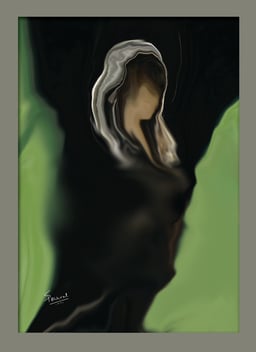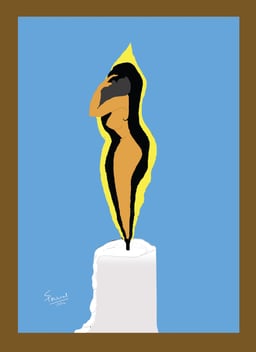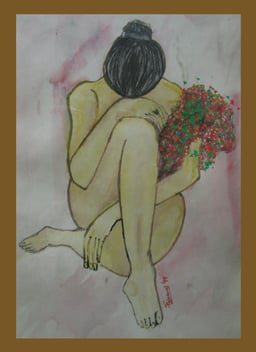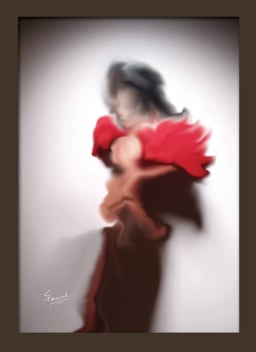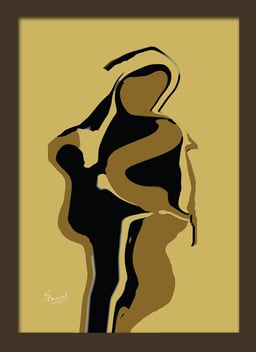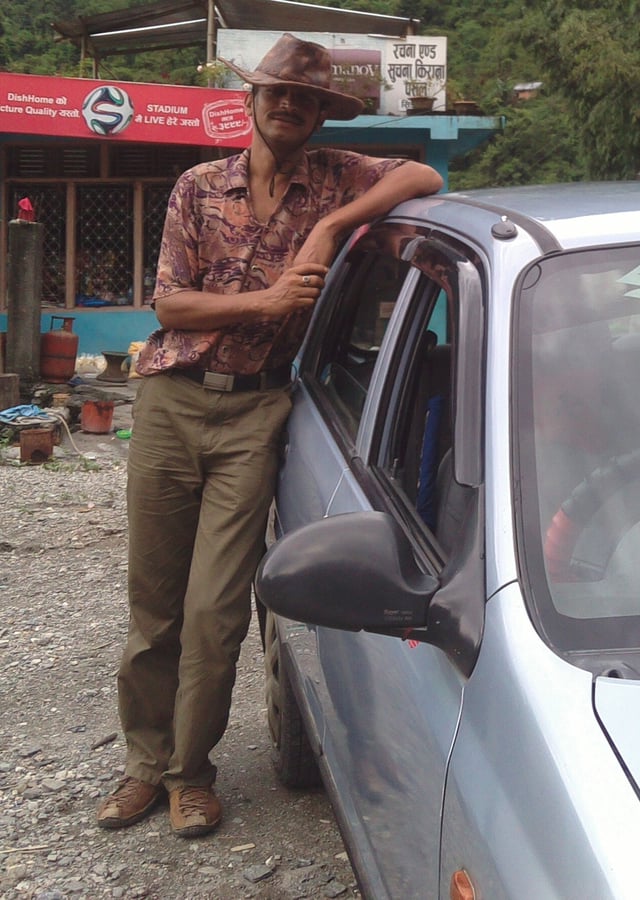Suman Pokhrel
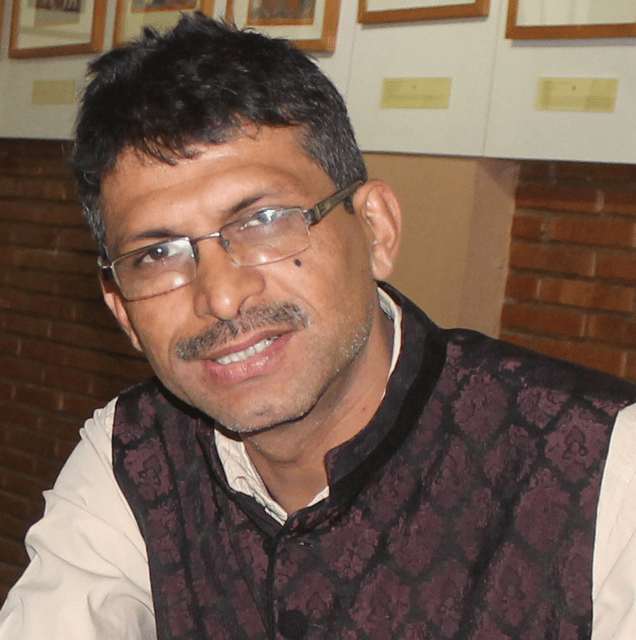
Suman Pokhrel

Suman Pokhrel | |
|---|---|
| Born | (1967-09-21)September 21, 1967[1] Mills Area, Biratnagar, Nepal |
| Occupation | Poet, lyricist, translator, artist |
| Nationality | Nepali |
| Education | BSc, MBA, BL |
| Notable works | Jeevanko Chheubaata Hazaar Aankhaa Yee Aankhaamaa |
| Notable awards | SAARC Literary Award 2015 SAARC Literary Award 2013 Parikalpna Award 2012 Jayandra Best Book of the Year 2009 |
| Spouse | Goma Dhungel |
| Children | Ojaswee Pokhrel and Mansun Pokhrel |
| Parents | Mukunda Prasad Pokhrel (Father), Bhakta Devi Pokhrel (Mother) |
| Relatives | Bidhyanath Pokhrel (Paternal grandfather) Ganesh Prasad Rijal (Maternal grandfather) |
| Website | |
| Suman Pokhrel's Nowhere [93] | |
Suman Pokhrel (Nepali: सुमन पोखरेल; born on September 21, 1967) is a Nepali poet, lyricist, playwright, translator and artist who is considered as one of the most important creative voices of South Asia. Universities have included his poetry in their syllabus and admirers have tattooed verses from his poems on their body parts.[2][3][4][5][6][7]
Suman Pokhrel | |
|---|---|
| Born | (1967-09-21)September 21, 1967[1] Mills Area, Biratnagar, Nepal |
| Occupation | Poet, lyricist, translator, artist |
| Nationality | Nepali |
| Education | BSc, MBA, BL |
| Notable works | Jeevanko Chheubaata Hazaar Aankhaa Yee Aankhaamaa |
| Notable awards | SAARC Literary Award 2015 SAARC Literary Award 2013 Parikalpna Award 2012 Jayandra Best Book of the Year 2009 |
| Spouse | Goma Dhungel |
| Children | Ojaswee Pokhrel and Mansun Pokhrel |
| Parents | Mukunda Prasad Pokhrel (Father), Bhakta Devi Pokhrel (Mother) |
| Relatives | Bidhyanath Pokhrel (Paternal grandfather) Ganesh Prasad Rijal (Maternal grandfather) |
| Website | |
| Suman Pokhrel's Nowhere [93] | |
Early life
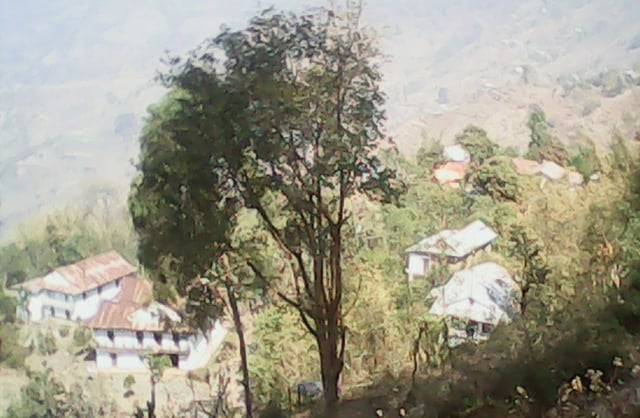
A view of Pokhrel's ancestral village Kachide
Suman Pokhrel was born on September 21, 1967 in Mills Area, Biratnagar, to Mukunda Prasad Pokhrel and Bhakta Devi Pokhrel.[10]
Suman Pokhrel attended Bal Mandir, a government owned Kindergarten in Biratnagar, until he was five. Pokhrel got moved to his ancestral village of Kachide in Dhankuta at the age of seven and raised there by his paternal grandmother. His paternal grandfather Bidhyanath Pokhrel was a poet and a politician. He was introduced to literature early through the influence of his grandfather's library, filled with Nepali, Hindi and classic Sanskrit literature. At the age of twelve, he moved back to Biratnagar to live with his parents. Pokhrel was mentored by his father, who was an engineer by profession and a bibliophile with a keen interest in art and literature.[10][11][12]
Career
Suman Pokhrel joined the Nepali civil service in Nepal Government as a Section Officer in February 1995. He left the job and joined Plan International in December 1998 as a development activist and went to the remote hilly region of the country. The job demanded visits to the more remote areas of the region.[13]
I would regard meanings given by others so far as refreshing boon, I would still be enamored of rose or any heartless flower's smell if tender tides of your affection had not suffused the pollen of my heart with loving aroma. modulations of my song, images of my poetry, my life story, all would be making a tedious dumb run with no destination sans beauty like sultry gusts of drought that flow over leafless treetops
A Multilingual poet, Suman Pokhrel has written in Nepali, English, Hindi and Urdu languages. Whereas, his works have been translated into several other languages, and are published in magazines and journals from across the countries.[15][16][17] Many of his works have been translated into other languages by various translators including himself.[18][19][20]
His work in English has appeared in notable journals and anthologies worldwide. Some of them include Snow Jewel.[21] Life & Legends;[6] The Songs We Share;[3] Sweet and Sour Dreams;[22] Global Poetry,[23] Learning & Creativity [95] ;[24] Grey Sparrow;[25] Prachya Review [96] ;[4] California Quarterly [97] ;[26] Asian Signature [98] ;[27] and in different volumes of Beyond Borders, South Asia;[28] and Art of Being Human,Canada.[29][30]
Pokhrel has read his poems for both national and international audiences. He has read his poems in SAARC Festivals of Literature in 2009, 2010, 2011, 2013 and 2015. He read his poem in SAARC Charter Day Celebrations on December 8, 2013 in New Delhi, India as an especial invitee. He recited his poems in Nepali during a monthly two-poet poetry recital program in Kathmandu in March 2015.[31] He read his poems at All India Poets' Meet in Orissa, India in February 2016 as an especial invitee poet from foreign country.[32]
Writings

Pokhrel receiving SAARC Literary Award 2013
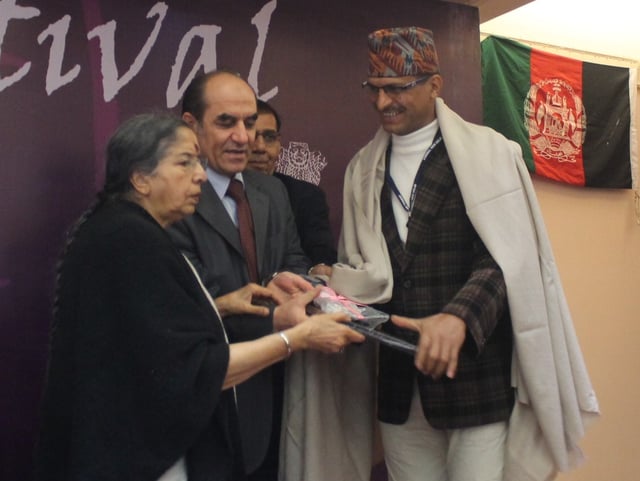
Pokhrel receiving SAARC Literary Award 2015
Suman Pokhrel is described as a poet with a strong tender voice.[6] Indian writer and critic Anuja Ghosh says, "Suman Pokhrel's poem Children creates tenderness in the mind. It is indescribable the way the poet has drawn out the innocence of children metaphorically with Nature. The rhetoric question at the end leaves an indelible mark in the minds of the reader. Whereas in his poem You Are, as You Are [99] , he exudes humility in expressing love. The importance of love quotient in one's life is spelled in this poem, a simple submission almost in the form of a ritual. There is an abundance of sublime purity in his expression of love."[33]
|
| Suman Pokhrel |
One of Suman Pokhrel's most quoted poems,[35][36] "Every Morning" emphatically declares the uncertainty of existence. It comes as a rude shock that how casually we take everything for granted. In a world which is filled with a plethora of violence, tragedy and devaluation of life the poet seeks gratitude for his being. His poem Every Morning is like a gentle reminder to mankind.[33]
His poem The Taj Mahal and My Love, is an innovative poem. The epitome of love creates awe in the mind of one and all, falls short to a lover who wants to give it all in this lifetime and not be delusional like Shah Jahan. The poet has penned down the poem with reverence to the greatness of the Taj Mahal.[37]
Works
As a translator, Pokhrel has translated works of several poets and writers from around the world into Nepali. He has translated William Shakespeare's play The Tempest into Nepali as Aandhibehari which is published by Nepal Academy in 2018.[45] His translations of poetry of Anna Akhmatova,[46] Anna Swir,[47] Allen Ginsberg,[48] Delmira Agustini,[49] Forough Farrokhzad,[50] Gabriela Mistral,[51] Jacques Prévert,[52] Mahmoud Darwish,[53]Nazik Al Malaika,[54][55] Nazim Hikmet,[56][57] Nizar Qabbani,[58] Octavio Paz,[59][60] Pablo Neruda,[61] Yehuda Amichai.[62] and Sylvia Plath,[63] are collected in Manpareka Kehi Kavita, an anthology of poetry in Nepali translation. His translations of fifty one of Kannada Language poets including Kuvempu, G. S. Shivarudrappa, D. R. Bendre, V. K. Gokak, U. R. Ananthamurthy, Siddalingaiah, P. Lankesh, K. S. Nissar Ahmed, Chandrashekhar Patil, Baraguru Ramachandrappa, Doddarange Gowda, Chennaveera Kanavi, Sumatheendra R Nadig, H. S. Venkateshamurthy, Gopalakrishna Adiga, Allama Prabhu, Manu Baligar, S. R. Ekkundi and Jayant Kaikini are collected in anthology titled Shashwat Awaj. Other prominent poets that he has translated into Nepali include Faiz Ahmad Faiz,[64] Sahir Ludhiyanvi,[65] Atal Bihari Vajpayee, Langston Hughes, Maya Angelou, Gulzar[66] and Uday Prakash among others. Ajit Cour,[67] Indira Dangi,[68][69][70] Sheema Kalbasi,[71] Anamika,[72] Kalpna Singh-Chitnis[73] Azita Ghahreman and Hélène Cardona[74][12][13] are other contemporary writers and poets whom he has translated into Nepali. Pokhrel's Nepali translations have been considered as among a few best literay translations brought into Nepali.[12]
Recognition and acceptance
Suman Pokhrel has been awarded SAARC Literary Award twice in 2013 and 2015. He has been regarded as one of the most important creative voices of South Asia.[4][78]
Pokhrel was invited as a special invitee to recite his poem in SAARC Charter Day on 8 December 2014. He has been invited to All India Poets' Meet in Orissa, India in February 2016 as a guest poet from a foreign country.[32]
Writers have quoted excerpts from Pokhrel's poems in their write-ups. Starting by quoting lines form Suman Prokhrel's poem "Every Morning", poet and literary critic Dr. Shividya Shivkumar wrote an article [100] in The Hindu on how poetry is responding to terrorism . Atula Gupta started her article [101] in Deccan Herald about environmental imbalance by quoting lines from Pokhrel's poem Before Buddha's Statue in the Rain. Mona Mehata has started one of her articles in Speaking Tree [102] by quoting lines from one of Pokhrel's poem. In her review [103] of a book by Manna Bahadur, Minakshi Mohan has started her writing by quoting lines from Pokhrel's poem "Every Morning". Emily T. Troscianko has concluded her article Who Wants to be Normal? [104] on Psychology Today by quoting the concluding lines of Pokhrel's poem Before Making Decisions.[35][79][80][81][82]
People including politicians, scholars and social media users from across the globe have widely quoted Pokhrel's poem "Every Morning" at different time and situations. Deputy Speaker of the National Assembly of Pakistan Qasim Khan Suri tweeted [105] the initial lines from this poem following Christchurch mosque shootings in New Zealand. Scholars have cited this poem in their thesis and other write-ups, while social media users from all walks of life have quoted and shared this poem to express their feelings at hard times.[83][84][85]
Universities in Nepal have included Suman Pokhrel's poetry in their syllabus of language and literature study. Tribhuvan University has included his poem 'Standing in Market' in syllabus of Bachelor of Education, whereas his poem 'The Tajmahal and My Love' is included in syllabus of Bachelor of Arts at Purbanchal University. Admirers of Suman Pokhrel's poetry have tattooed verses from his poems on their body parts.[7]
Discography
| Song Title | Music Composer(s) | Artist(s) | Released Year | Album |
|---|---|---|---|---|
| Kati Mithaa Kathi Nyanaa [106] | Bednidhi Poudel | Debesh Rai | 2015 | |
| Dharti Aakashbhanda Para [107] | Bednidhi Poudel | Chezen Dahal | 2014 | Madhumas |
| Timi Ra Ma Ani [108] | Bednidhi Poudel | Chezen Dahal | 2014 | Madhumas |
| Sangai Bitaune Yo Raatlai [109] | Bednidhi Poudel | Chezen Dahal | 2014 | Madhumas |
| Alikati Ma Banchaunla [110] | Bednidhi Poudel | Debesh Rai | 2014 | Madhumas |
| Na Ta Din Bhayo [111] | Bednidhi Poudel | Dipen Rai | 2013 | |
| RataBhari Royen [112] | Ramkumar Rajdhami | Manoj Magar | 2011 | |
| Aaja Yo Andhyarole [113] | Bednidhi Poudel | Samjhana Rai | 2011 | |
| Satte Hola Unisanga [114] | Bednidhi Poudel | Sheela Rai | 2011 | |
| Pagliyera Pokhiun Jhain [115] | Bednidhi Poudel | Bednidhi Poudel | 2011 | |
| Kati Mithaa Kati Nyanaa [116] | Bednidhi Poudel | Bednidhi Poudel | 2010 | |
| Dubera Yo Sansar Talaauma [117] | Bednidhi Poudel | Bednidhi Poudel | 2004 | Madhuras |
| Aaja Yo Andhyarole [118] | Bednidhi Poudel | Bednidhi Poudel | 1999 | Chadke Nazar |
Art Works and Paintings
[[INLINE_IMAGE|//upload.wikimedia.org/wikipedia/commons/thumb/f/fc/Yewati_04.jpg/87px-Yewati_04.jpg|//upload.wikimedia.org/wikipedia/commons/thumb/f/fc/Yewati_04.jpg/131px-Yewati_04.jpg 1.5x, //upload.wikimedia.org/wikipedia/commons/thumb/f/fc/Yewati_04.jpg/174px-Yewati_04.jpg 2x|Nepali Art|h120|w87]]
a painting entitled 'Yuwati' from 'Women' series by Suman Pokhrel
[[INLINE_IMAGE|//upload.wikimedia.org/wikipedia/commons/thumb/9/9a/Nareedeep_%28%E0%A4%A8%E0%A4%BE%E0%A4%B0%E0%A5%80%E0%A4%A6%E0%A5%80%E0%A4%AA%29.jpg/87px-Nareedeep_%28%E0%A4%A8%E0%A4%BE%E0%A4%B0%E0%A5%80%E0%A4%A6%E0%A5%80%E0%A4%AA%29.jpg|//upload.wikimedia.org/wikipedia/commons/thumb/9/9a/Nareedeep_%28%E0%A4%A8%E0%A4%BE%E0%A4%B0%E0%A5%80%E0%A4%A6%E0%A5%80%E0%A4%AA%29.jpg/131px-Nareedeep_%28%E0%A4%A8%E0%A4%BE%E0%A4%B0%E0%A5%80%E0%A4%A6%E0%A5%80%E0%A4%AA%29.jpg 1.5x, //upload.wikimedia.org/wikipedia/commons/thumb/9/9a/Nareedeep_%28%E0%A4%A8%E0%A4%BE%E0%A4%B0%E0%A5%80%E0%A4%A6%E0%A5%80%E0%A4%AA%29.jpg/174px-Nareedeep_%28%E0%A4%A8%E0%A4%BE%E0%A4%B0%E0%A5%80%E0%A4%A6%E0%A5%80%E0%A4%AA%29.jpg 2x|Nepali Art|h120|w87]]
a painting entitled 'Nareedeep' from 'Women' series by Suman Pokhrel
[[INLINE_IMAGE|//upload.wikimedia.org/wikipedia/commons/thumb/8/8a/Patience_%28%E0%A4%A7%E0%A5%88%E0%A4%B0%E0%A5%8D%E0%A4%AF%29.jpg/87px-Patience_%28%E0%A4%A7%E0%A5%88%E0%A4%B0%E0%A5%8D%E0%A4%AF%29.jpg|//upload.wikimedia.org/wikipedia/commons/thumb/8/8a/Patience_%28%E0%A4%A7%E0%A5%88%E0%A4%B0%E0%A5%8D%E0%A4%AF%29.jpg/131px-Patience_%28%E0%A4%A7%E0%A5%88%E0%A4%B0%E0%A5%8D%E0%A4%AF%29.jpg 1.5x, //upload.wikimedia.org/wikipedia/commons/thumb/8/8a/Patience_%28%E0%A4%A7%E0%A5%88%E0%A4%B0%E0%A5%8D%E0%A4%AF%29.jpg/174px-Patience_%28%E0%A4%A7%E0%A5%88%E0%A4%B0%E0%A5%8D%E0%A4%AF%29.jpg 2x|Nepali painting|h120|w87]]
a painting entitled 'Patience' from 'Women' series by Suman Pokhrel
[[INLINE_IMAGE|//upload.wikimedia.org/wikipedia/commons/thumb/d/de/Mother_and_Child_08.jpg/87px-Mother_and_Child_08.jpg|//upload.wikimedia.org/wikipedia/commons/thumb/d/de/Mother_and_Child_08.jpg/131px-Mother_and_Child_08.jpg 1.5x, //upload.wikimedia.org/wikipedia/commons/thumb/d/de/Mother_and_Child_08.jpg/174px-Mother_and_Child_08.jpg 2x|Nepali painting|h120|w87]]
a painting from 'Mother and Child' series by Suman Pokhrel
[[INLINE_IMAGE|//upload.wikimedia.org/wikipedia/commons/thumb/4/49/Mother_and_Child_07.jpg/87px-Mother_and_Child_07.jpg|//upload.wikimedia.org/wikipedia/commons/thumb/4/49/Mother_and_Child_07.jpg/131px-Mother_and_Child_07.jpg 1.5x, //upload.wikimedia.org/wikipedia/commons/thumb/4/49/Mother_and_Child_07.jpg/174px-Mother_and_Child_07.jpg 2x|Nepali Art|h120|w87]]
a painting from 'Mother and Child' series by Suman Pokhrel
Awards
International
National
See also
Suman Pokhrel bibliography


